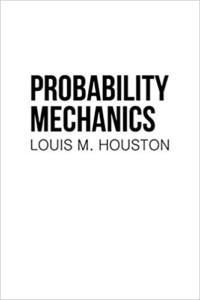 Title: Probability Mechanics
Title: Probability Mechanics
Author: Louis M. Houston
Publisher: AuthorHouse
ISBN: 978-1-5462-1021-4
Pages: 74
Genre: Non-Fiction, Scientific Theory, Education
Reviewed by: Dr. Robert Kayne
Pacific Book Review
Author Louis M. Houston has compiled, what could be considered, a dissertation in Probability Mechanics; exploring the differences between quantum theory mechanics and the principles of determination within the Universe. In a remarkable summation of many coexisting theories by scores of noted physicists and mathematicians, Houston has taken an ambitious role to explain the pros and cons of various theories supported by his algebraic formulas interleaved within this book. Perhaps a bit “long-haired” for the layperson without prior introductory knowledge in the realm of quantum physics, Probability Mechanics carries forth the understanding the Universe was created without a divine intervention nor intelligence, and that gravity is deterministic; meaning pre- determined with the consistency of having a predicted outcome. Supported by formulas explicitly representing his platform of logic, one must agree with his conclusions as being profound.Some of his examples bring out fascinating philosophical realizations. For example the law of attraction, as generally discussed in a noted franchise of philosophy titled The Secret by Rhonda Byrne; says people can create their own wealth and happiness by concentrating their thoughts on positive energies. On the contrary, negative thoughts and energy prolific negative circumstances. Now it is one thing to wish to believe this, however Houston actually proves the underlying relationships of energy it with his formulas. Another realization Houston writes about is the work by Dr. Bruce Lipton in his book Biology of Belief. In Lipton’s book it is explained how conscious thought is performed with a very low spectrum of electromagnetic frequencies, in the 0-60 Hz range, whereas subconscious thoughts occur some 500,000 times faster, hence using much more power. Houston once again peels the onion on the foundation of these findings. Yet another is Dr. Michio Kaku, a popular theoretical physicist and futurist concurs with Houston’s belief of the multi-verse, as nothing in nature exists by itself; there is no “one” of anything.
All of these summations simply scratch the surface on the depth of knowledge and supportive algebraic formulas contained in Probability Mechanics. As the coinage “We don’t know what we don’t know” has been popularized in politics, it applies equally well with the emerging theories of quantum and probability mechanics. Louis M. Houston has brought the readers of this book “up a wrung of understanding,” and as such has created a book which is a must-read for those wishing to be on the forefront of modern theoretical physics.
Probability Mechanics is an excellent read, interesting and provides a unique but clear description of quantum mechanics. If you’re looking to have your intellectual boundaries pushed in a way they’ve never been before, this book is for you.

